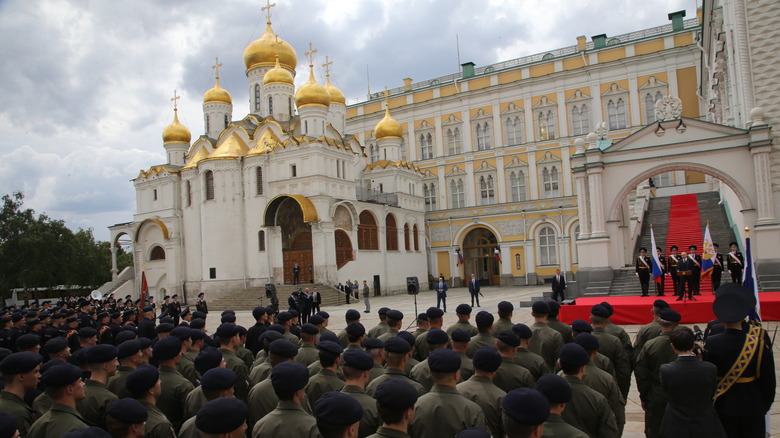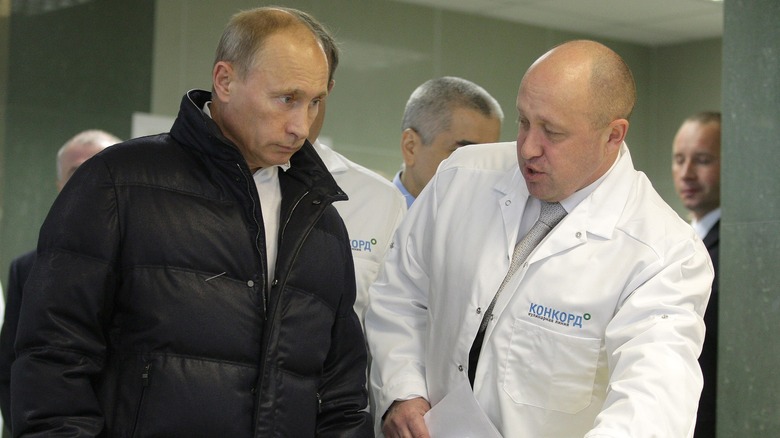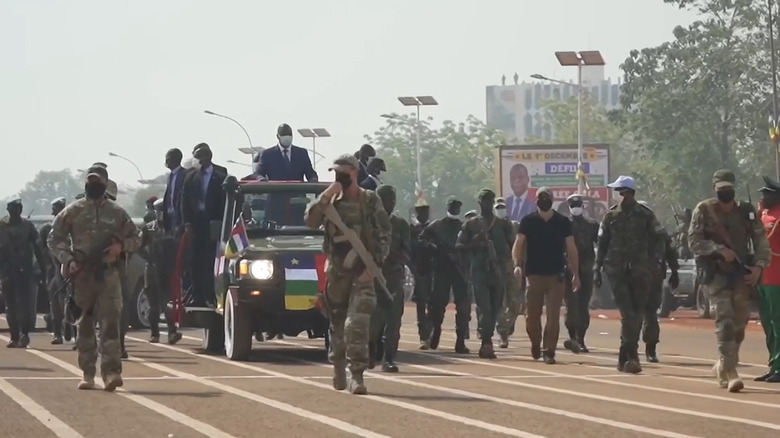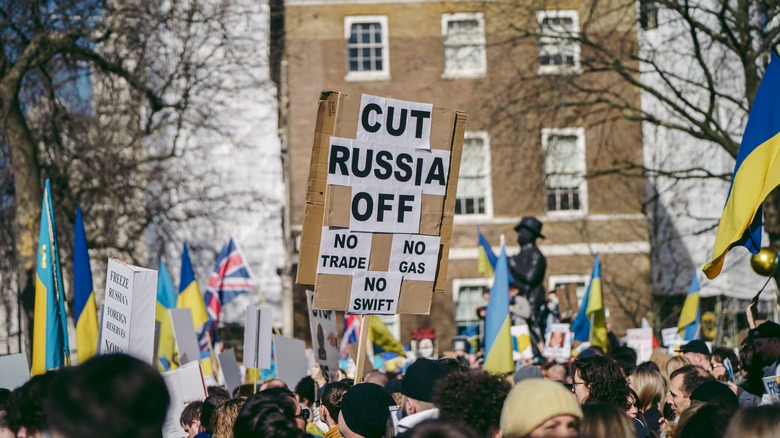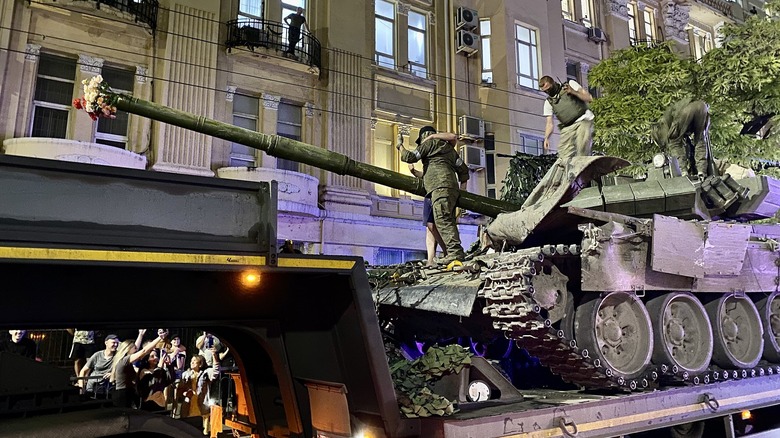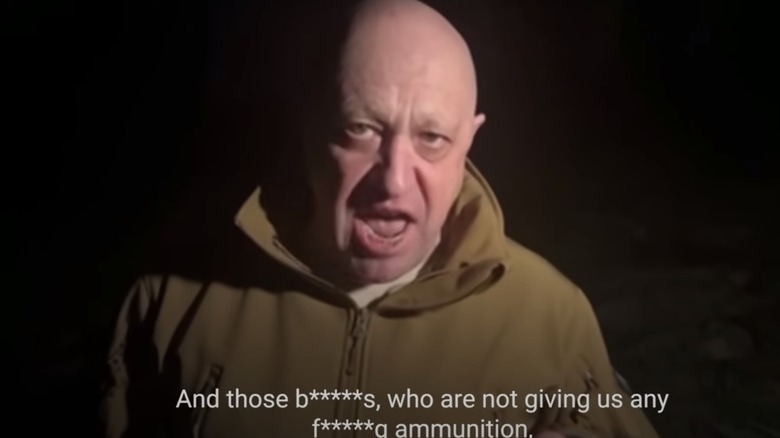The Wagner Group Military Mutiny Against Moscow Explained
"Mercenaries and auxiliaries are useless and dangerous; and if one holds his state based on these arms, he will stand neither firm nor safe; for they are disunited, ambitious, and without discipline, unfaithful, valiant before friends, cowardly before enemies; they have neither the fear of God nor fidelity to men." Those words, spoken by the original realpolitik statesman Niccolò Machiavelli in his 1513 treatise "The Prince," certainly ring true for Russian president Vladimir Putin today.
Putin's Kremlin-paid paramilitary outfit the Wagner Group — mercenaries, in simple terms — recently turned from Ukraine and marched on Moscow from June 23 to 24, 2023. Per Al Jazeera, they stopped 125 miles short of the Russian capital with their tanks and soldiers in the streets after having occupied the city of Rostov-on-Don and a Russian military base along the way. Then — as though Putin and Wagner leader Yevgeny Prigozhin tossed up white flags — the rebellion ended. No one knows precisely what happened.
We're left with a mountain of information and speculation. Al Jazeera reports that Prigozhin says the rebellion was not a rebellion at all, but a protest against the "injustice" of Russian authorities. In The Guardian, Prigozhin says that Russia's war in Ukraine was built on a lie that framed Ukraine as a conspiring aggressor. But as the BBC explains, the march on Moscow came at the end of years of Russian oligarchic rivalries, and another BBC article lays out a long personal relationship between Putin and Prighozin now turned sour.
Prigozhin has since died in a plane crash on August 23, 2023 (via NBC).
Chef turned mercenary maestro
Could the recent Wagner Group rebellion have centered on a fallout between two old pals, Vladimir Putin and Yevgeny Prigozhin? Not quite, but there's some truth in there. Ten years ago, Prigozhin was called "Putin's chef," as the BBC explains. That's not a euphemism, either. Prigozhin operated a Kremlin-serving catering group, Concord, for over 20 years, personally serving food to Putin. By all accounts, Prigozhin showed fearlessness when serving foreign dignitaries, and Putin took a liking to him. Putin even celebrated his birthday with Prigozhin in 2003. Before Concord, Prigozhin opened a series of restaurants in St. Petersburg in the 1990s. Before that, he owned some hot dog stands. Before that, he was in prison. Starting at the age of 18, he spent 11-and-a-half years total behind bars for robbery and theft.
How Prigozhin went from the food service industry to mercenary overlord of the Wagner Group is unknown. In fact, as the BBC says, Prigozhin denied any relationship with Wagner until just last year in 2022. The timing of the Wagner Group's formation — 2014 — was non-coincidental. That year Russia invaded Crimea and took it from Ukraine. Since then, as the Associated Press says, Russia has been using the Wagner Group around the globe — especially in Syria, Lybia, and the Central African Republic — to get away with military action that it couldn't undertake with its own army. Now the whole plot has blown up in everyone's faces.
[Featured image by Government of the Russian Federation via Wikimedia Commons | Cropped and scaled | CC BY 4.0 International ]
The Wagner rise to dominance
Folks might be wondering why the Russian military didn't just swarm in and crush Yevgeny Prigozhin's Wagner Group when its 25,000 troops turned towards Moscow. The answer to that question is also the answer to the reason why Vladimir Putin funded the mercenaries to begin with: they've gotten too powerful. As Form Guru explains, they're better equipped than the Russian military, better trained, and more brutal. The Kremlin has dumped a lot of money into them for their activities — $1 billion from May 2022 to May 2023 alone, per the BBC. There are legal reasons, too, as NPR says that Wagner is technically not even a Russian company. Russian law precludes the creation of paramilitary groups, so Wagner is actually a collective of offshore shell companies operating under the umbrella of the Russian intelligence community.
Besides funding, the Wagner Group rose in power through propagandistic recruitment campaigns (per The Observers) and widespread global military action. Per Al-Jazeera, they've been supporting the dictatorial government of the Central African Republic since 2018, and propped up military coups in Mali in 2020 and 2021 to overthrow its government. In 2018 they joined the Syrian army against U.S. special forces, as The War Horse details. Just to illustrate how savage the Wagner Group is, Reuters reports on a now-infamous 2022 video showing a Wagner soldier getting his head smashed in with a sledgehammer for defecting to Ukraine. Prigozhin simply said of the executed man, "Nuzhin was a traitor."
The role in Ukraine
In December 2021, months before Russia invaded Ukraine, the Associated Press tells us that the European Union condemned the Wagner Group for, "serious human rights abuses, including torture and extrajudicial, summary or arbitrary executions and killings, or in destabilizing activities in some of the countries they operate in," including the Donbas region of Ukraine. Wagner, "recruited, trained and sent private military operatives to conflict zones around the world to fuel violence, loot natural resources and intimidate civilians in violation of international law, including international human rights law," the EU's statement continued. As the Militaire Spectator states, the Wagner Group also took part in the 2014 annexation of Crimea, right when the group was formed.
Wagner had been playing a key role in Russia's offensive strategy against Ukraine leading up to its recent rebellion, particularly in the region of Bakhmut, one of the longest-lasting, bloodiest fronts of the war. In May 2023, Ukrainian soldier Myroslav said on the BBC that Wagner was leading the Russian troops in the region. "They are fighting quite well," he said, "but they don't really care about their people." Another soldier, Mykola, said, "They just walk towards us, they must be on drugs."
In late May, Al-Jazeera reported that Yevgeny Prigozhin and the Wagner Group showed up on video raising Wagner flags in Bakhmut. After 224 days in the "Bakhmut meat grinder," they claimed to have taken the region, although Ukraine said differently. Less than a month later the Wagner Group marched on Moscow.
The march on Moscow
And so we come to the actual Wagner Group rebellion. Al-Jazeera has a timeline of the entire, convoluted series of events. On June 23, after claiming Bakhmut for Russia, Wagner leader Yevgeny Prigozhin announced that Russia's military leadership was "evil" and "must be stopped." He called for armed mutiny against the Russian state and some of his troops started marching towards Moscow. At the time, Vladimir Putin called Prigozhin a "traitor" while claiming that Prigozhin's troops had been "deceived and dragged into a criminal adventure." Russian helicopters opened up on Wagner troops during their march, and various world leaders spoke up about who would side with who. Twenty-four hours later the whole thing was done.
Prigozhin was exiled to Belarus, Russia's greatest global ally, in a deal apparently brokered by Belarusian President Alexander Lukashenko. Politico reports that, as of June 27, Russia already dropped its criminal case against the Wagner Group. The BBC, however, said at the time that Russia was continuing to investigate Prigozhin himself for treason. Al-Jazeera adds that any Wagner troops not involved in the rebellion have been offered military contracts with the Russian government directly. The Kyiv Independent reports that Putin went so far as to praise the Wagner troops as "patriots," in addition to praising "the solidarity of our society" in the face of the rebellion.
Many, meanwhile, including Ukrainian president Volodymyr Zelenskyy, have pointed out that the Wagner rebellion shows how vulnerable and weakened Putin's state has become, as Deutsche Welle details.
Simmering rivalries and hatreds
Yevgeny Prigozhin gave lots of surprisingly clear-sighted reasons as to why he ordered the Wagner Group to march on Moscow. Per The Guardian, he said that there was no justification for the war against Ukraine and that the Russian government "is trying to deceive the public" by concocting a story about Ukraine working with NATO to invade Russia. In a video on The Times, Prigozhin said that the "children of the [Russian] elite apply cream to themselves and upload it to Instagram," while the children of common people "come back in zinc coffins." As the BBC reports, Prigozhin also called out Russian military heads Sergei Shoigu and Valery Gerasimov on camera with dead Wagner soldiers in the background, saying, "Shoigu! Gerasimov! Where is the ... ammunition? ... They [Wagner soldiers] came here as volunteers and die for you to fatten yourselves in your mahogany offices."
Animosities run both ways. The Wagner Group's check on Shoigu and Gerasimov's power has bred resentment within governmental circles of Prigozhin, in turn. Prigozhin also stated that Shoigu and Gerasimov have tried to take credit for his work. All the while, Prigozhin wisely said nothing against Vladimir Putin directly. This might be due to their decades-long relationship, or it might just be Prigozhin being smart. It might also be why Putin merely exiled Prigozhin at the time rather than flatten the man.
